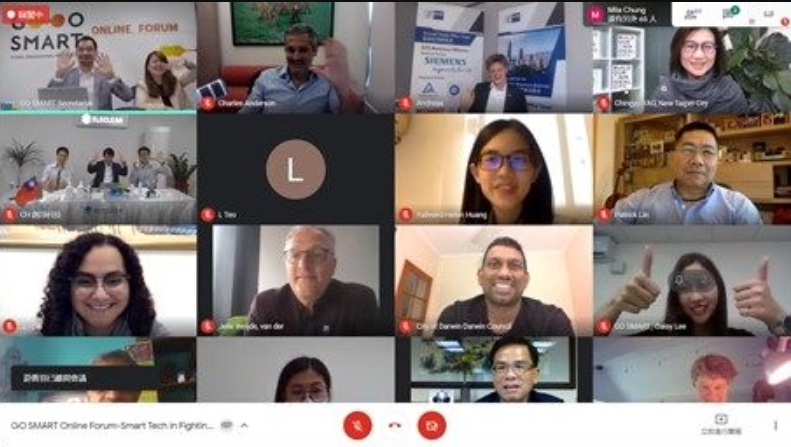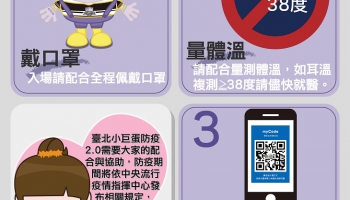GO SMART, the global smart city platform chaired by Taipei City, held the technological conversation on epidemic prevention on April 29th, 2020.
In this unprecedented and challenging time, governments around the world have sought help to tackle COVID-19 as it spreads across the world, and companies have innovated great solutions or products to help in the fight as well. As a global smart city platform, GO SMART has organized an online forum “Smart Tech in Fighting COVID-19” between 4 pm to 6 pm on April 29th, 2020 (Taiwan Time) inviting government representatives and solution providers to put their heads together. “A problem shared is a problem halved,” and a solution shared is a solution doubled.
The representatives from eight cities and government units – Taipei City, Darwin City from Australia, Economic Board Utrecht from Nertherlands, World Smart Sustainable Cities Organization (WeGO), Government of Canada in Seoul, Taoyuan City, New Taipei City and German Trade Office Taipei – were invited to share their experiences and policies on fighting the pandemic, while nine vendors also shared their epidemic prevention-related solutions. More than 130 people attended online and conversed freely about their epidemic prevention experience and solutions.
Public and private departments from across the world were able to start a conversation surmounting spatial restrictions, enabling them to share cross-domain research cases and technological epidemic prevention experiences. Taipei City Government, as the Chair of GO SMART, was invited to share how it has kept the virus at bay. Taipei is the capital city of Taiwan, which is an island of 23 million people located just off the coast of China. During the early stages of the pandemic, an estimate predicted that Taiwan would face the second-highest “importation risk” in the world. However, there were only 441 cases (as of May 22) so far.
Mr. Kuan-Ting Chen, the Deputy Spokesperson of Taipei City Government, delivered the opening remarks. He shared the success story of Taipei’s epidemic prevention efforts: “As a result of the collaboration between the central and local authorities, big data is applied for advanced preparation – accurate and rapid diagnostic test as well as instantly tracking people under quarantine with mobile phones, thereby allowing the people in Taiwan to still be able to work and go to school. Moreover, Taipei City is actively collaborating with industries to promote technological epidemic prevention while enhancing its epidemic prevention capacity.”
With the COVID-19 pandemic spreading across the world, “technological epidemic prevention” has also become a popular topic for participants. The team from Industrial Technology Research Institute (ITRI) introduced the lightweight (600g) rapid diagnostic system (Nucleic Acid Molecule Detection System); ELECLEAN published the globally pioneering disinfectant spray machine that uses water as the raw material; Origin Wireless detects and tracks patients’ body conditions via precision breathing device, and Yallvend collaborated with Taiwan’s central authority and Taipei City Government to launch the ID-based mask vending machine, and so on. Throughout the event, the attendees expressed praises towards the power of technological epidemic prevention.
Many governments are finally turning the tide in the fight against COVID-19 after weeks and months of efforts. It’s crucial that we all continue to share best practices with each other, so we don’t reimport the virus back into our communities and face another wave of infections. The technologies presented during this GO SMART online forum, either adopted by the city governments or developed by the industrial players, are contributing significantly to the fight against COVID-19.
GO SMART was established in March 2019 to provide a platform promoting knowledge exchange and facilitating inter-city collaboration via PoC (Proof-of-Concept) projects, which in turn accelerates urban innovation and speeds up smart city development.
GO SMART Website: https://www.citiesgosmart.org/
-
Source:Department of Information Technology, Taipei City Government / Publish Date:2020-05-27










